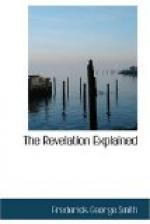CHAPTER XVI.
And I heard a great voice
out of the temple saying to the seven
angels, Go your ways, and
pour out the vials of the wrath of God
upon the earth.
2. And the first went, and poured out his vial upon the earth; and there fell a noisome and grievous sore upon the men which had the mark of the beast, and upon them which worshipped his image.
A great voice out of the temple, now filled with the glory of the divine presence, commanded the seven angels to enter upon their mission. It came, therefore, from God, who alone fixed the time for these judgments to begin.
Before an intelligent explanation of these plagues can be given, however, the following points must be made clear: 1. Where the vials were poured out. 2. Upon whom they were emptied. 3. Why they were thus poured out. 4. When they were fulfilled, or, rather, at what time they began to be fulfilled. These points we will first briefly consider in the order named, after which we will discuss the nature of the plagues and their individual application.
1. The place where these vials of wrath were poured out was “upon the earth”; that is, the Apocalyptic earth, or that portion of the earth made the special subject of Apocalyptic vision; namely, the territory of the ten kingdoms. The last two vials, however, will be found to embrace a larger territory.
2. They were poured out upon those “which had the mark of the beast, and upon them which worshiped his image.” It has already been shown that the image made by the second beast of chapter 13 was the Protestant ecclesiastical organizations; hence the “beast” here referred to, to which the image was made, must signify the ecclesiastical hierarchy of Rome, the original. So the plagues fell upon the adherents of both organized Romanism and Protestantism in Europe.
3. The reason why the judgments of the first three vials especially descended upon them was because “they had shed the blood of saints and prophets.” Verse 6. That Romanism was a fierce oppressor of God’s people has already been noticed: Protestantism as their persecutor, also, must now be considered further. Protestant sects after they first became established and got power in their own hands, acted much in the same manner as the church of Rome did before them, persecuting, banishing, imprisoning, and even putting to death those who refused to receive their tenets or to conform to the system of religion they had adopted. The Lutherans, at first a pious, persecuted people, on becoming numerous and exalted by the favor of the great, established a certain system of religion and then, when it was in their power, persecuted, imprisoned, banished, or put to death all that dissented. As early after the Reformation as 1574, in a convention at Torgaw, they established the real presence in the eucharist and instigated




